April 2007 Archives
So, I'm posting for two reasons:
- I want to "claim my blog" at Technorati. To do that, I need to post this HTML: Technorati Profile.
- I want to verify that this machine, redefine.dyndns.org is still working.
Why wouldn't my machine still be working, you ask? Well, yesterday I made a shady Craigslist-style deal, and acquired some new RAM for this machine. When I went to install it today, I found that one of the Western Digital hard drives that I have in my new mirrored array had failed. Of course, I never bothered to setup the monitoring in FreeBSD, so who knows how long it has been dead.
Anywho, the RAID certainly protected my data, but trying to boot with just one disk in the array was a little funky. Apparently, when my RAID adapter has one drive missing from its mirrored drive set, it reverts to JBOD mode. When FreeBSD sees this, it rebuilds /dev, and now my disk shows up as /dev/ad4s1a instead of /dev/ar0s1a.
Yuck.
Anyways, it is all working now, I think. And when Western Digital's website comes back online, I'll see if I can RMA my drive.
-Andy.
Even though things have been pretty busy over at Aggregate Knowledge lately -- that doesn't mean that we don't have fun.
In point of fact, yesterday, a good chunk of the office was down in L.A., attending a taping of "The Price Is Right". Bob Barker, an American TV institution some 35 years, is retiring this year. That means that getting into this show is harder than ever. But strings were pulled, favors called in, and so a bunch of folks were able to go.
I didn't attend, but the stories that I heard were pretty funny. One thing that tickled me, in particular, were the custom shirts that were printed up:
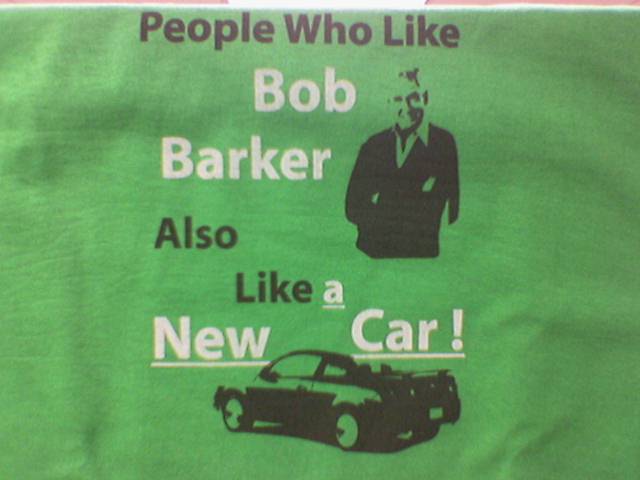
Recommendations humor. It never gets old.
But it's not all trips for the chance to win cash and prizes. A few weeks ago, we finally became a "real" startup and got a foosball table installed. And by "got installed", I mean that our Controller, Rich, put it together himself. But nearly everyone is partaking - I got this shot on my cell phone on the way out of work the other day:
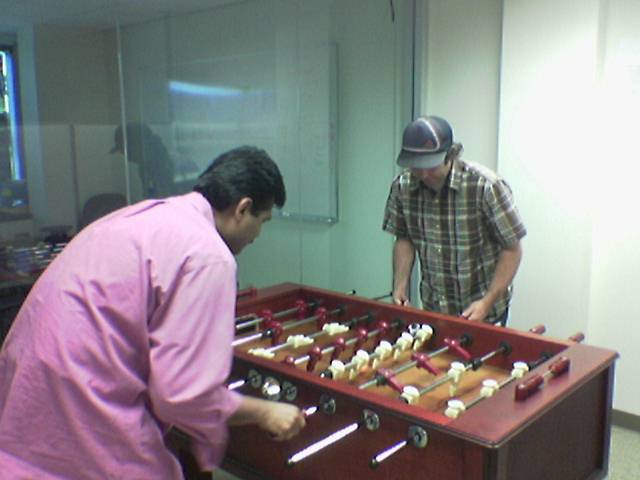
Raj and Matt playing foosball.
So far, no one's been hurt, and no office rivalries have formed (that I know of). Foosball is a fairly competitive sport, however, so who knows what will happen going forward...
-Andy.
Getting older appears to be fraught with many perils. I've had a bump on my noggin for a few years now, and in the last several months, it has been getting bigger. Much bigger. So, a few weeks ago, I hoisted myself over to the Kaiser, to let a trained professional have a look. The pronouncement came down that it was just a cyst, nothing to really worry about, but something that I could have removed if I wanted.
It has been bugging me for awhile, so I thought getting it removed was a pretty good idea.
And it was a pretty good idea, up until the anesthetic wore off a few hours ago.
D'oh.
I spent about 10 minutes blindly taking pictures of my head, so that you (gentle blog reader) could get a look:

The stitches, closing the hole that got cut into my head today.
What came out of that gash was a chunk of fluid, blood, hair, and skin that was easily the size of two skittles stacked one ontop of another. That might not sound like much, but try cramming that under the skin between your skull and the outside world.
All in all, the procedure went really well -- the Kaiser was as brutally efficient as always, getting me in and out of there in just slightly over an hour. And when I get the stitches out, and this thing starts to feel better, I'm sure I'll be really glad that my head is slightly less misshapen than it has been. But for the next week or so, I think I'm going to be a bit grumpy, as this thing nags at me.
-Andy.
Well, my dad wore my mom down, and after only a month and a half, they have gotten a new dog. Well, as it turns out, they got two dogs:

Maggie and Max
Sara sent me an e-mail telling me the news, that I thought was pretty funny. So rather than regurgitate what she said, I'm just posting her e-mail after the jump...
-Andy.
Technorati Tags: Westie, West Highland White Terrier
A little over a month ago, I blogged about my current running regimen. At that time, I said that one of my reasons for going with the Nike+ iPod kit was to try and start running longer distances. Well, I'm proud to say that I have finally started making my "normal" route a ~3.5 mile run, instead of ~2.5 miles.
I'd show you an updated graph from the Nike+ site, but it's currently down (and I'm too embarrassed to say who it is hosted by). So, I grabbed this screen shot out of my iTunes instead:
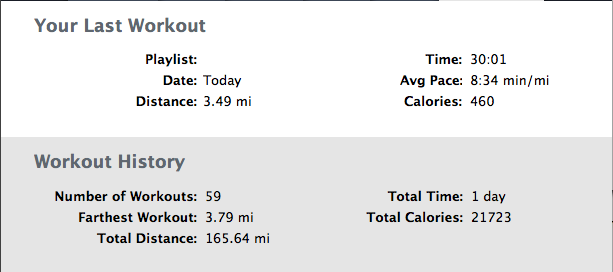
My last workout (3.49 miles) and workout history (over 165 miles).
As you can see, I had a pretty decent run today - covering ~3.5 miles in 30 minutes is a pretty good pace for me. When I first started this new route, it was taking me around 34 minutes to cover the same distance.
One thing that I've noticed about running 3.5 miles is that as of right now, I can't do this route 6 times a week -- my legs get too tired by about the 4th time in a row, and I need to take a day off. I'm hoping that if I keep at this, however, that I'll be able to increase my stamina.
-Andy.
In my last post about Apple, I put forth the idea that Apple's strategy of putting their advanced OS X operating system in all of their devices was going to enable them to surpass their competitors in a number of fields. In my post, I mainly talked about the advantages that Apple gained by adapting OS X to run on everything from the Apple TV to the iPhone. What I didn't talk about, were the disadvantages of this strategy.
Fortunately, shortly after I made my post, my friend Carl chimed in via the comments section, with one big negative that this strategy could possibly incur for Apple:
"I think Windows fell apart partly because of the number of combinations of devices it had to be able to support as it grew. Apple has limited this by controlling the core hardware, but I'm not sure they can limit it forever. Either way, the more platforms they have to keep going simultaneously with OS X, the harder it will be to get full test coverage."
While I had planned to respond to Carl's comment, my planned response has certainly changed, as of yesterday. Because it was yesterday that Apple announced that Mac OS X Leopard is going to ship 4 months late -- because Apple has been focusing on getting the iPhone out the door by "late June".
So, score one for Carl -- he identified a very real pain point that Apple is experiencing with their new OS X strategy. And while I think that Apple might need to beef up it's OS engineering in the mid to short term in order to deal with the new reality of OS X, yet like Carl, I don't think that's going to be enough. Unlike Carl though, I do think that there is a way for Apple to have OS X run on many different devices, yet still avoid Microsoft's fate.
How is Apple going to achieve this feat you ask, gentle reader? Why, with a trick, of course. Let me point you to an Ars Technica article from February, that didn't make many waves in the Mac blogosphere: "Intel's coming embedded play". The basic thrust of this article is that in the wake of Intel's sale of their XScale division, instead of exiting the embedded market, Intel might be coming at it from a different direction - namely building embedded chips that can execute the x86 ISA. For why this matters to Apple (especially in light of it's current predicament), I'll leave it to Jon "Hannibal" Stokes to explain:
"To put it another way, do you really think that Apple wants to pay programmers to work on an ARM port of Darwin? Me neither. But right now, ARM is what will fit in the iPhone. The minute that x86 fits in the iPhone, then the software cost equation changes for Apple in ways that may make x86 more attractive."
If this new CPU really does come to pass (and I think that it will -- the argument for it is certainly compelling), then Apple will find itself in a situation where they can write code for one ISA, and have it run everywhere. Because there will be x86-compatible chips in Apple's future phones, iPods, TV set top boxes, and Macintoshes. This will limit the amount of devices that the OS X team has to support, helping Apple get their economy-of-scale groove back on.
And now, do we see why Steve Jobs got Apple in bed with Intel, and not AMD?
:)
-Andy.
Technorati Tags: Apple, Macintosh, Steve Jobs, Intel, Analysis, Ars Technica, iPhone, Apple TV, Mac OS X, x86, Instruction Set Architecture
One more quick note - I also managed to get a link on Daring Fireball yesterday. I think it's like the 3rd time that I have e-mailed John Gruber (proprietor of said blog), but I guess this one was worthy. It was certainly interesting to me. :)
-Andy.
Technorati Tags: Microsoft, Daring Fireball
The company that gives me sole employment, Aggregate Knowledge, announced it's series B funding today (see also coverage on TechCrunch). As an employee of said company, this is pretty good news. Having folks in the VC company believe in you is a definitely a good thing. And while this doesn't guarantee any sort of long-term success, it certainly does give us the capital that we need in order to be in the fight for the long term.
I've said it before and I'll say it again -- I think that 2007 is going to be one hell of a ride. :)
-Andy.
Yesterday, I wrote in support of the theory that Microsoft is no longer relevant in driving the computer industry forward. One of the points that I used to buffet my argument was "that in the age of web-based applications, the OS that you run is largely irrelevant". To put it another way, the idea of selling a computer operating system in a box for some sort of profit is an idea that is on it's way out.
I think that Apple has figured this out, and rather than trying to rest on their laurels and wring the maximum amount of profit out of their old business model, I believe that they are innovating instead.
As evidence, let's examine a not-related-to-Mac-OS-X bit of news that happened earlier this week. On Monday, Apple announced that they have sold over 100 Million iPods. While in and of itself, this announcement has many implications for the future of music and media (and of course the Zune, which is looking more and more screwed by the minute), I want to focus on something else that I noticed in the press release.
At the end of every Apple press release, they have some standard boilerplate text, which is meant toot Apple's horn about all of their great accomplishments. It is normally the same thing every time, and usually looks something like this:
"Apple ignited the personal computer revolution in the 1970s with the Apple II and reinvented the personal computer in the 1980s with the Macintosh. Today, Apple continues to lead the industry in innovation with its award-winning desktop and notebook computers, OS X operating system, and iLife and professional applications. Apple is also spearheading the digital music revolution with its iPod portable music players and iTunes online music store." (emphasis mine, from "Apple Unveils New iMac with Intel Core Duo Processor")
In the 100 Million iPod press release, however, this boilerplate text was changed slightly, and now looks like this:
"Apple ignited the personal computer revolution in the 1970s with the Apple II and reinvented the personal computer in the 1980s with the Macintosh. Today, Apple continues to lead the industry in innovation with its award-winning computers, OS X operating system and iLife and professional applications. Apple is also spearheading the digital media revolution with its iPod portable music and video players and iTunes online store, and will enter the mobile phone market this year with its revolutionary iPhone." (emphasis mine)
The main change between these two passages that I wish to highlight isn't the iPhone, but rather the fact that in the newer passage, Apple has de-emphasized the Macintosh. It is a small change, but important nonetheless. I also want to highlight the fact that in all of Apple's press releases since July of 2004, they call their operating system "OS X", and not "Mac OS X". This change has been noted before (most recently during the iPhone announcement), but I find it interesting that Apple has been using the "OS X" moniker publicly since 2004.
What I think that these changes signify is that Apple is dealing with the commoditization of the operating system in a fairly novel way. Instead of divesting themselves from their OS, by either open sourcing it or selling it to a 3rd party, Apple is instead moving OS X into the core of the company. Even after the iPod became a huge success, the core of Apple was the Macintosh - that was at the core of the "digital hub". Yet, now we are seeing the Macintosh being de-emphasized, in favor of OS X.
I believe that Apple has had a very key insight into the future of digital devices. In the "old days", the way you made any digital device more capable than a stop watch was to start off with an embedded operating system. Something that was built from the start to be small and efficient, both in terms of memory utilization and CPU requirements. This is what Microsoft has done with Windows CE - which isn't really Windows at all - it has a totally separate kernel from the Windows NT line. However, when you start with a small OS that has limited features, so that it can run in a limited space - it is very hard to build a "next generation" digital device. I'm talking about a device that can play back media files (audio, video), multitask, and provide robust networking requirements.
Instead of playing the same game that Microsoft and others are playing (starting with a small OS, that you make bigger with newer functionality), they did the reverse -- they stared big, and got small. They "shrunk" OS X down to the point where it could run efficiently on an embedded device (which, if you know software engineering at all, then you know that this was a fairly amazing accomplishment). This means that Apple is going to be able to make digital devices that accomplish amazing things, all by leveraging their investment in OS X.
Going forward, Apple's product mix is going to look like this:
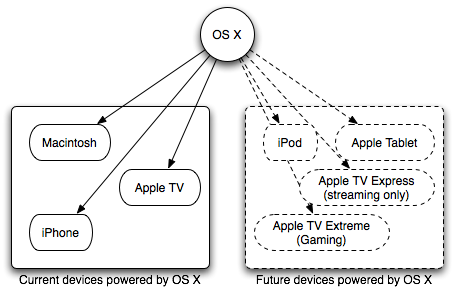
OS X at the center of Apple's world (also in PDF, OmniGraffle)
On the left-hand side of my diagram, we have the devices Apple is (or will be, come June) shipping that are powered by OS X. On the right-hand side, are all of the things that Apple could build, now that they have a sufficiently powerful embedded operating system.
What's in it for Apple? Not only do they get to continue to leverage their investment in OS X, but they will also be able to run circles around their competitors (Nokia, Motorola, Palm, RIM, Microsoft) - none of whom have such an advanced OS. In addition, as the market for personal computers levels off, Apple has found several new revenue streams for their OS division. Finally, by virtue of making OS X, as well as several of its premier applications (think iLife and their professional apps), Apple is sitting on the premier Cocoa development houses in the entire world. Going forward, they will be able to leverage that incredible engineering talent to make new and amazing applications for their embedded OS, extending the innovative hot streak that they have been on for the last decade.
Wow. Now, more than ever, I can't wait to see what the future holds for Apple.
-Andy.
It's not great secret that I haven't harbored much love for Microsoft over the last several years. In fact, I couldn't wait to switch to Mac OS X back in late 2001, so that I could start to get out from under the oppressive thumb of The Evil Empire. So it was with great interest that I read Paul Graham's latest essay, "Microsoft is Dead" (as well as its companion, "Microsoft is Dead: The Cliffs Notes").
Overall, I agree with Paul's main point - namely that Microsoft's total dominance of the industry isn't looking anywhere near as strong as it once was. But, I started to think about the situation in my current company. I have been saying that things are 60/40 Windows vs. Mac at Aggregate Knowledge. This wasn't me sitting down and counting things up -- instead, this was a gut feeling. So, today I actually counted things up.
As it turns out, I was wrong - it's really almost 50/50 Mac vs. Windows (the Mac is currently ahead slightly, in fact). More telling, however, is how OS usage breaks down among staff function. Of the folks at AK who have primarily technical roles, only two of them run Windows as their primary OS. That means that the rest of the company (sales, marketing, other support staff) is where Windows dominates. Anecdotally, this supports Paul Graham's point that "All the computer people use Macs or Linux now. Windows is for grandmas, like Macs used to be in the 90s".
Two points come out of this, however. It is clear to me that the last bastion of Microsoft's legacy of lock-in is the Outlook/Exchange combination. Many of our new hires have joined AK with essentially "their whole professional lives" in Outlook, which is not something that they are willing to mess with. In addition, even in this day and age, strong alternatives to the calendaring functionality offered by Outlook/Exchange are hard to come by. I think that Google is making a decent in-roads with their calendar application, and I have high hopes for the CalDav server coming in Mac OS X Leopard. But for now, we need for the market to address the final bastion of Microsoft's dominance, so that IT people such as myself can begin to convert longtime Outlook users into using something else.
The other point that occurred to me is that the above numbers that I have quoted change significantly if instead of looking at the primary OS, I instead look at total number of OS licenses. Many of the Mac users at AK have Parallels installed, and a Windows license as well, so that they can continue to use legacy Windows applications. This lends more anecdotal evidence to the meme that I first saw John Gruber coin, namely that "Windows is The New Classic". In addition, it lends credence to the theory that the golden age of the desktop operating system has passed - that in the age of web-based applications, the OS that you run is largely irrelevant.
This hurts Microsoft the most, because they still derive a large portion of their profits from Windows (and also from Office).
So, things really aren't looking to great for Microsoft. The only thing that keeps me from joining Paul Graham in saying that they are "dead" is the fact that Microsoft is at its most fearsome when it is playing from behind.
Well, that, and they have like 30 billion dollars in the bank. But for now, I'm going to enjoy the current golden age, where I can run whatever OS I like, and still have access to all of the applications that I need (read: Google).
-Andy.
While I'm not too much of a baseball fan myself, when Kalpana scored us some tickets to yesterday afternoon's S.F. Giants vs. L.A. Dodgers baseball game, you know that I had to go. So a bunch of us headed off to spend a nice, sunny (albeit, not overly warm) day in San Francisco:
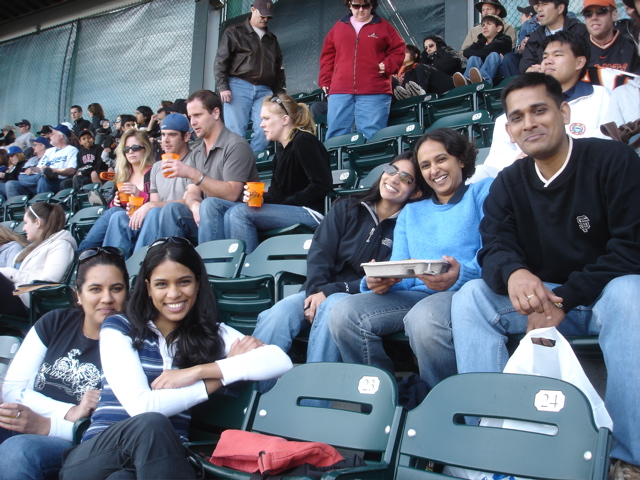
L-R: Praman, Kalpana, Anjali, Pratima, and Ravi
An even though the Giants lost, I think this game was a decent first introduction to seeing a live baseball game for Kalpana and Anjali. I'm told that next time it will be my turn to experience a sport that I have never seen -- namely watching a cricket match. And I suppose, since fair is fair, I could be up for that.
-Andy.
